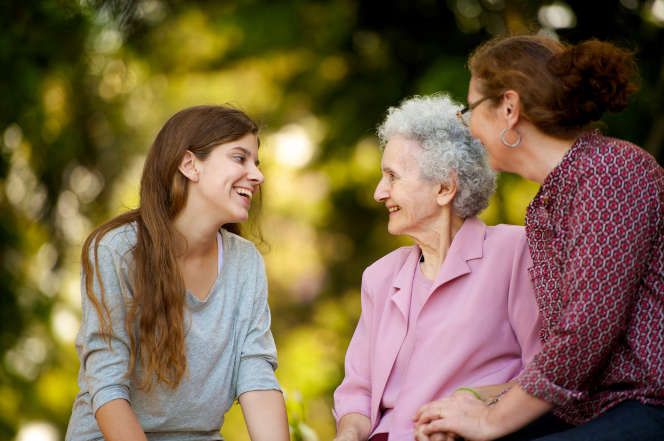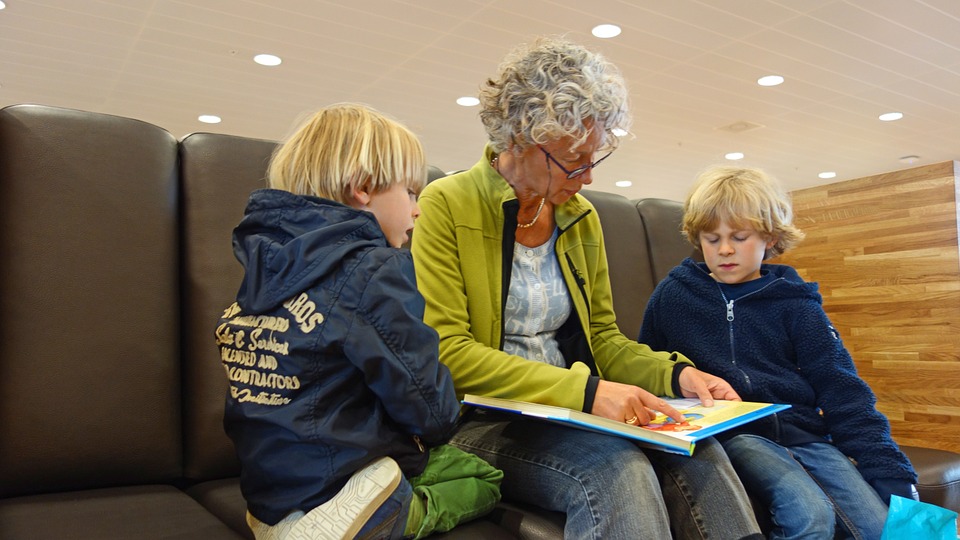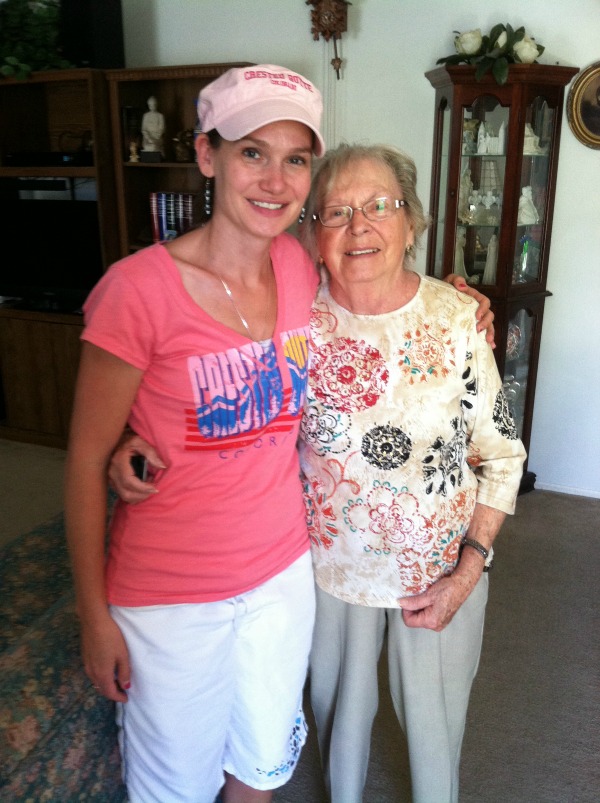The last time I saw my Grandma, she was lying in bed, recovering from another fall. She looked up at me and said, “There’s my Lisa.” In the way that my Grandma always does that makes me feel like I am the most important person in the room. We talked and I held her hand. I didn’t know that would be the last time I saw her alive.
A month or so later, I received a call that my Grandma didn’t have much longer to live. We didn’t know if that were days or weeks, and I couldn’t leave right then. So I took my kids to the beach in the town where I live. I have fond memories of my grandparents at the beach, and I wanted to feel close to my Grandma. As I sat peacefully in the sun with my kids, I thought of the legacy that my grandparents and parents have left for me. A legacy of love, faith and commitment. Of joy, laughter and spending time with family. Of service in The Church of Jesus Christ of Latter-day Saints. Of creating memories that will last a lifetime—and into the eternities. The next morning, she passed away peacefully in her sleep.
As I have reflected on my Grandmother and her legacy, I realized that she taught me more through her actions than through her words. She was the epitome of the phrase, attributed to St. Francis of Assisi, that says, “Preach the gospel at all times and if necessary, use words.” So here are the lessons that I learned from watching my Grandma:
1. Take care of your marriage and spouse.
One of the greatest lessons I learned from my Grandmother is about loving your spouse and honoring your marriage. Elder Richard G. Scott taught,
Two of the vital pillars that sustain Father in Heaven’s plan of happiness are marriage and the family. Their lofty significance is underscored by Satan’s relentless efforts to splinter the family and to undermine the significance of temple ordinances, which bind the family together for eternity.
The Church of Jesus Christ teaches that a husband and wife who are sealed to each other in the holy temple and remain faithful to their covenants can be married not only for time but also for eternity. President Ezra Taft Benson said,
Marriage itself must be regarded as a sacred covenant before God. A married couple have an obligation not only to each other, but to God. He has promised blessings to those who honor that covenant.
Fidelity to one’s marriage vows is absolutely essential for love, trust, and peace. … Husbands and wives who love each other will find that love and loyalty are reciprocated. This love will provide a nurturing atmosphere for the emotional growth of children. Family life should be a time of happiness and joy that children can look back on with fond memories and associations.
But a marriage that will last through eternity is still built a day at a time here on earth. Elder F. Burton Howard said,
Eternal implies continuing growth and improvement. It means that man and wife will honestly try to perfect themselves. It means that the marriage relationship is not to be frivolously discarded at the first sign of disagreement or when times get hard. It signifies that love will grow stronger with time and that it extends beyond the grave. It means that each partner will be blessed with the company of the other partner forever and that problems and differences might as well be resolved because they are not going to go away. Eternal signifies repentance, forgiveness, long-suffering, patience, hope, charity, love, and humility. All of these things are involved in anything that is eternal, and surely we must learn and practice them if we intend to claim an eternal marriage.
My grandparents cultivated their relationship through the good times and the bad. They created memories of fun times, love and laughter not only for their children but also for their grandchildren. As they got older, their relationship grew stronger. Elder Scott said,
The temple sealing has greater meaning as life unfolds. It will help you draw ever closer together and find greater joy and fulfillment in mortality.
This was certainly true for my grandparents. Their eternal relationship took on greater meaning in my Grandpa’s later years when he was diagnosed with Alzheimer’s disease. He suffered with this terrible illness for 17 years. But they were in it together, and my Grandma nursed him and took care of him until he passed away at home. That was nearly 20 years ago. But even at her funeral, it was hard to talk about my Grandma without talking about my Grandpa. Their lives, their hearts and their marriage were united in life—and in death.
2. Cherish your family.
Family was always an important part of my Grandma’s life. She made each one of us feel special. We all felt like we were “hers.” Elder Howard said,
If you want something to last forever, you treat it differently. You shield it and protect it. You never abuse it. You don’t expose it to the elements. You don’t make it common or ordinary. If it ever becomes tarnished, you lovingly polish it until it gleams like new. It becomes special because you have made it so, and it grows more beautiful and precious as time goes by.
This is the way that my Grandma treated her marriage and her family—with love and care. Everyone was always welcome at Grandma’s house. She always lit up when she saw us. She had candy for the kids (and the adults). She was always interested in our lives and helped whenever she could. She never missed an opportunity to visit her children and grandchildren in whatever parts of the country they were living. And she was always willing to help out. She helped me pack up my house when my husband, kids and I moved from Salt Lake City to Colorado. And even though she lived in Salt Lake City, she drove to Colorado to help when we moved from Colorado to Idaho.
Another way she showed her love for family was by sewing. She made a baby blanket for my oldest son, and when my fourth child claimed it as his own, she made a second one as a spare in case the first one got lost. When it did, she made a third one.
She welcomed the spouses of her children and grandchildren into the family with open arms. No one ever felt like an in-law around her—you were just part of the family. Perhaps one of the sweetest evidences of that is that her daughter-in-law—my sweet aunt—not only helped my Grandma take care of my Grandpa during his illness, she also took care of my Grandma during the last few years of her life. Both times, my aunt brought my grandparents into her home. And for my aunt, it was a labor of love. Elder Marvin J. Ashton said,
True love is a process. True love requires personal action. Love must be continuing to be real. Love takes time. Too often expediency, infatuation, stimulation, persuasion, or lust are mistaken for love. How hollow, how empty if our love is no deeper than the arousal of momentary feeling or the expression in words of what is no more lasting than the time it takes to speak them. …
We must at regular and appropriate intervals speak and reassure others of our love and the long time it takes to prove it by our actions. Real love does take time. The Great Shepherd had the same thoughts in mind when he taught, “If ye love me, keep my commandments” (John 14:15; italics added) and “If ye love me feed my sheep” (John 21:16; italics added). Love demands action if it is to be continuing. Love is a process. Love is not a declaration. Love is not an announcement. Love is not a passing fancy. Love is not an expediency. Love is not a convenience. “If ye love me, keep my commandments” and “If ye love me feed my sheep” are God-given proclamations that should remind us we can often best show our love through the processes of feeding and keeping.
That is how my Grandma showed her love—through her actions. I know she loves me because she showed me every time she saw me.
3. Be faithful to the covenants you make.
My Grandma loved the Mormon Church. She was a faithful member and loved to serve others. She also loved music—and she found a way to combine her loves by serving as the chorister in her congregation for many years. Although she willingly served wherever she was asked, this was perhaps her favorite calling. She was a talented vocalist and often sang during church services. Serving others at Church and elsewhere is an important aspect of life in the Mormon Church. President Boyd K. Packer said,
The willingness of Latter-day Saints to respond to calls to serve is a representation of their desire to do the will of the Lord. That arises from the individual witness that the gospel of Jesus Christ, restored through the Prophet Joseph Smith and contained in the Book of Mormon, is true.
Our baptism is a call to lifelong service to Christ. Like those at the waters of Mormon, we are “baptized in the name of the Lord, as a witness before him that [we] have entered into a covenant with him, that [we] will serve him and keep his commandments, that he may pour out his Spirit more abundantly upon [us.]”
But the response to calls, to positions, is only a small part of the service given by members of the Church.
I see two kinds of service: one, the service we render when we are called to serve in the Church; the other, the service we willingly give to those around us because we are taught to care.
Throughout her life, my Grandmother did both. She didn’t really talk to me about serving others, she just did.
Another way she showed her commitment to the gospel was by making time to attend the temple. To Mormons, the temple is a sacred house of worship. President Packer explained,
In the temples, members of the Church who make themselves eligible can participate in the most exalted of the redeeming ordinances that have been revealed to mankind. There, in a sacred ceremony, an individual may be washed and anointed and instructed and endowed and sealed. And when we have received these blessings for ourselves, we may officiate for those who have died without having had the same opportunity. In the temples sacred ordinances are performed for the living and for the dead alike.
The year before I got married, I had the opportunity to go to the temple once a week with my Grandma. It was a difficult year for me, and I found peace and comfort as I went to the temple with my Grandma. President Packer taught,
When members of the Church are troubled or when crucial decisions weigh heavily upon their minds, it is a common thing for them to go to the temple. It is a good place to take our cares. In the temple we can receive spiritual perspective. There, during the time of the temple service, we are “out of the world.”
Sometimes our minds are so beset with problems, and there are so many things clamoring for attention at once that we just cannot think clearly and see clearly. At the temple the dust of distraction seems to settle out, the fog and the haze seem to lift, and we can “see” things that we were not able to see before and find a way through our troubles that we had not previously known.
The Lord will bless us as we attend to the sacred ordinance work of the temples. Blessings there will not be limited to our temple service. We will be blessed in all of our affairs.
That year I not only got to go to the temple and partake of the peace and joy therein, but I also got to spend that precious time with my Grandma. We would always eat lunch after attending the temple, and I saw and felt her love for the temple. I cherish those experiences and the time that I got to spend alone with my Grandma.
4. Take time to have fun.
My Grandma worked hard and took care of a lot of people. But she also took time to have fun. She and my Grandpa loved music. During the early years of their marriage, my Grandpa had a Big Band orchestra and my Grandma sang in it. They did fun things as a family like boating and waterskiing. After my Grandpa passed away, she went to Machu Picchu in Peru as well as the Holy Land. She visited children and grandchildren not only to help but also to play. Gary K. Palmer, at the time a teaching professor of Recreation Management and Youth Leadership at Brigham Young University, explained,
If we will learn to laugh and play more with our families, not only will we feel better but so will they. “A merry heart doeth good like a medicine,” says Proverbs 17:22. Studies show that humor and laughter help people live longer, happier lives; be more creative and productive; and have more energy with less physical discomfort. Humor reduces stress, fear, intimidation, embarrassment, and anger. Laughter also has extraordinary healing power. When a person laughs, blood pressure decreases, heart rate and respiration increase, the body releases endorphins, and depression declines. After the laughter subsides and you relax again, that good feeling has a lasting effect, even until the next day. Not many medicines will do that.
My Grandma understood the power of laughter and having fun. But she also knew where to find true happiness and joy in life. Elder Claudio R.M. Costa said,
[When] I was baptized in the Church, [a]n old friend of mine came to me and asked what I had found so different there. I answered, “I have found true happiness.” To which he replied, “There is no such thing as true happiness—only happy moments.”
I understand that my good friend did not know the difference between fun and happiness. What he called “happy moments” were in fact the moments when he had fun. What he did not know then was that happiness is much more than just fun. Fun is just a fleeting moment, but happiness is a lasting thing. …
Both fun and happiness are fine, but certainly happiness is the most worth seeking. Happiness can encompass fun as well, but fun alone will not assure us true happiness.
My Grandma found joy in the little things, in people and moments. But she also took time to have fun doing the things that she enjoyed.
5. Grandmas are treasures.
Perhaps the greatest lesson I’ve learned is that grandmas are treasures. President Gordon B. Hinckley’s words to the older sisters in The Church of Jesus Christ are true of my Grandmother:
You are a great treasure. You have passed through the storms of life. You have weathered the challenges now facing your younger sisters. You are mature in wisdom, in understanding, in compassion, in love and service.
There is a certain beauty that shines through your countenance. It is the beauty that comes of peace. There may still be struggle, but there is mature wisdom to meet it. There are health problems, but there is a certain composure concerning them. The bad memories of the past have largely been forgotten, while the good memories return and bring sweet and satisfying enrichment to life.
You have learned to love the scriptures, and you read them. Your prayers for the most part are prayers of thanksgiving. Your greetings are words of kindness. Your friendship is a sturdy staff on which others may lean.
What a resource are the women of The Church of Jesus Christ of Latter-day Saints. You love this Church, you accept its doctrine, you honor your place in its organization, you bring luster and strength and beauty to its congregations. How thankful we are to you. How much you are loved, respected, and honored.
The day of my Grandma’s funeral, it was tough to let her go. I just wanted to stay at her side and be with my Grandma. But I take comfort in the knowledge that I will see her again. And until that time, I will cherish the lessons that I learned from my Grandma.








